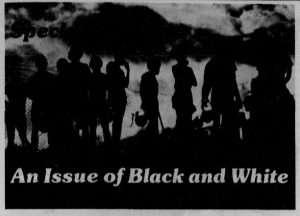by Kirsten Avila
Kirsten Avila is a senior from Malibu, California, majoring in Interdisciplinary Studies: Business of Media, Culture, and Communication, with a minor in History. The most interesting part of the project for her has been learning about the University’s reluctance to comply with Title IX and the Civil Rights Act of 1964. This post was written as a part of Digital Memory & the Archive, a course offered in Fall 2017.
 The Collegian article titled “Title IX is Slow Moving,” published on February 16, 1978, discusses the implementation of the Title IX law passed by Congress in 1972. Title IX states that no one should be excluded on the basis of sex in the participation, benefits, or subjected to discrimination under any education program or activity receiving financial assistance. The passing of Title IX was extremely vital to the progress of gender equality because it granted women equal opportunity for scholarship and sports as men. The Collegian article goes through and assess the University of Richmond’s slow progress in fully implementing Title IX across all women’s sports. The Collegian interviews Assistant Athletic Director, Carol Reese, who claimed that there had been progress since the University now provided women practice uniforms and shoes. Additionally, Reese argued that the reason why the University of Richmond was behind other school is due to the lack of funding: “It takes money to build a competitive program.” Carol Reese and the article concludes that the reasoning behind the University’s slow progress in executing Title IX was the lack of funding.
The Collegian article titled “Title IX is Slow Moving,” published on February 16, 1978, discusses the implementation of the Title IX law passed by Congress in 1972. Title IX states that no one should be excluded on the basis of sex in the participation, benefits, or subjected to discrimination under any education program or activity receiving financial assistance. The passing of Title IX was extremely vital to the progress of gender equality because it granted women equal opportunity for scholarship and sports as men. The Collegian article goes through and assess the University of Richmond’s slow progress in fully implementing Title IX across all women’s sports. The Collegian interviews Assistant Athletic Director, Carol Reese, who claimed that there had been progress since the University now provided women practice uniforms and shoes. Additionally, Reese argued that the reason why the University of Richmond was behind other school is due to the lack of funding: “It takes money to build a competitive program.” Carol Reese and the article concludes that the reasoning behind the University’s slow progress in executing Title IX was the lack of funding.


